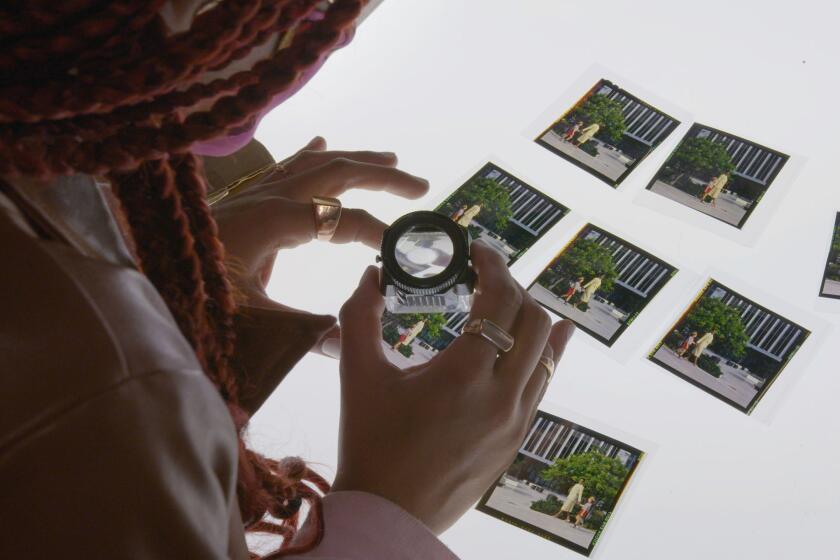Review: Ed Helms and Patti Harrison make a perfect platonic match in ‘Together Together’
The Times is committed to reviewing theatrical film releases during the COVID-19 pandemic. Because moviegoing carries risks during this time, we remind readers to follow health and safety guidelines as outlined by the Centers for Disease Control and Prevention and local health officials.
The prodding inquiries — “Have you ever stolen anything?” “Are you religious?” “What’s the worst thing you’ve ever done?” — that open Nikole Beckwith’s modest, charming dramedy “Together Together” don’t spring from a painfully intrusive first date. Rather, as an open Anna (Patti Harrison) spills her proclivity for thieving pens and her experience of putting her baby up for adoption while in high school to a perplexed Matt (Ed Helms), she’s interviewing to become his surrogate.
“This appeals to me because I know it’s not the best thing in the world, being alone,” rambles Anna, as a piano’s inviting notes stutter to a comedic stop. Helms’ expressive reactions, delivered with aplomb, interlock delightfully with Harrison’s wry appeal.
For Matt, Anna represents his third attempt at fatherhood — his previous eight-year relationship came to naught and Beckwith’s slight script never divulges the other try. Either way, Matt desperately wants this bid to succeed. You get the feeling that the 26-year old Anna might be his last chance.
The simple set-up, which sees Harrison, a transgender actress cast in a cisgender role, allows for fascinating subversions of the rom-com frame while remaining familiar at its core. Seeing disparate individuals brought together by chance, empathizing despite their differing backgrounds, is one of the things that draws us to films. The easeful, unvarnished rapport Helms and Harrison generate through their touching performances is the steady cradle to this brisk two-hander.
The lonesome humor and hurt propelling “Together Together” splinters the film from other examples in the growing subgenre of meditative fertility narratives. Beckwith’s caustic tone diverges from Jeremy Hersh’s “The Surrogate,” wherein the titled surrogate learns her baby tested positive for Down syndrome, leading to a morally complicated choice. Tamara Jenkins’ intimate dark-comedy, “Private Life,” mines a couple’s long struggle with fertility to elucidate the ways such endless battles wear down its resilient participants. The love burrowing inside “Together Together” is platonic, and the separate lifelong disappointments felt by Anna and Matt are shared but less entangled.
Anna works as a barista at a coffee shop. She hasn’t attended college, leaving school and her estranged family by moving to San Francisco after her pregnancy. She hopes the money from Matt will fund an accelerated degree program in Vermont. The inversion of her fortunes — how one pregnancy closed a door, whereas this will open another — is not just symmetrical. Anna’s gestation will lead to two (re)births: this child and Anna’s future.
As a 20-something woman who becomes a gestational surrogate for a 40-something single man, Patti Harrison breaks new ground with an unexpected change from her absurd, sardonic stand-up comedy.
Matt’s life, similarly, is in limbo. His friends either have families or are “desperately clinging to the corpse of their youth,” leaving Matt without real connections. In three chapters — titled the first, second and third trimester — Beckwith carefully unpacks the insecurities lurking underneath these two unfulfilled figures.
An app designer, Matt earned a sizable fortune creating a platform called “Loner,” which allows users to low-grade stalk others online without disrupting physical boundaries. Matt regularly overcompensates; he brings a life-sized teddy bear to Anna that might as well have lights saying “metaphor” above it, expects her to log her food intake and brings a daily thermos of pregnancy tea to her job.
In strained tight frames, he’s regularly surprised by Anna’s despondency toward the baby, never comprehending why Anna would steal herself from the eventual heartbreak of giving up the child. He’s just so giddy. His excitement reels her into , at times, a one-sided partnership that’s without boundaries and likewise, Alex Somers’ playful single piano score turns nursery rhyme in tone. Helm and Harrison’s honest portrayals, their sharp give-and-go’s, pack this burgeoning platonic love with a delicacy that in lesser hands would either be overtly sexual — like a Woody Allen romantic comedy, as Anna jokes about their age gap — or strictly transactional.
Instead, biting loneliness pervades their journey. See, long-striving couples usually seek the surrogacy route, not single men like Matt. And surrogates typically find comfort in a support system at home. When Anna and Matt separately attend group therapy, they discover the uniqueness of their respective situations, deriving only a modicum of consolation from the other participants. Their niche creates a void, a need for an empathetic voice, a fulfillment they can only find in each other. They watch “Friends” together — an allusion that feels too on the nose by the film’s end — support the other’s dreams and commiserate about terrible families.
Writer-director Nikole Beckwith and stars Ed Helms and Patti Harrison discuss ‘Together Together,’ premiering as part of the U.S. dramatic competition at the 2021 Sundance Film Festival.
Both Anna and Matt bear the weight of overbearing, judgmental mothers. Anna’s family appears in glimpses: Her mother leaves a prying voicemail after discovering the pregnancy, and a possible sighting of her fathers occurs at the coffee shop. They actively exist in her mind, the way floodwaters recede only to return at unwanted times. And since Anna keeps them at a distance, we’re kept there too. Though Matt’s mother (Nora Dunn) appears, their complex relationship, the particular disappointment she has for her son, leaves one wanting greater detail.
For all the sizable gains Beckwith accrues building out Anna and Matt’s platonic companionship, she loses as much underdeveloping the intriguing supporting players. Matt solely knows Anna’s sardonic gay co-worker, Jules (Julio Torres), as the person who exchanges cold stares with him. Jean (Sufe Bradshaw), a dryly sarcastic nursing technician, and the involuntary audience to Anna and Matt’s disagreements — whether Anna should have sex with other men while pregnant or why they shouldn’t know the baby’s gender — provides big deadpan laughs. The pair’s couples therapist, Madeline (Tig Notaro), is often two lines short of meaningful revelations. Dunn, Torres, Bradshaw and Notaro all instill their characters with a deeper interiority than the script allows, making them indelible additions whose inchoate existence further frustrates viewers the more frustrated.
Beckwith’s breezy dramedy starts to grind through the third trimester: Anna asks for stricter boundaries from Matt, only to relent without reason, causing the formerly spontaneous “Together Together” to wind to a predictable finish. While a filmmaker needn’t provide every answer or explore every avenue, Beckwith constantly teases bigger pitches than she delivers.
Why did Anna ultimately reconnect with Matt? Why did she again knowingly open herself to possible sorrow? These questions, akin to the intrusive inquiries of the opening sequence, require a ruthless honesty, an honesty Beckwith avoids in lieu of less- complicated pastures. By the grace of a talented cast, especially the reliable Helms and the revelatory Harrison, “Together Together” is a sweet, albeit incomplete search for companionship in the unlikeliest of places.
'Together Together'
Rating: R, for some sexual references and language
Running time: 1 hour, 30 minutes
Playing: In general release April 23; digital release May 11
More to Read
Only good movies
Get the Indie Focus newsletter, Mark Olsen's weekly guide to the world of cinema.
You may occasionally receive promotional content from the Los Angeles Times.











